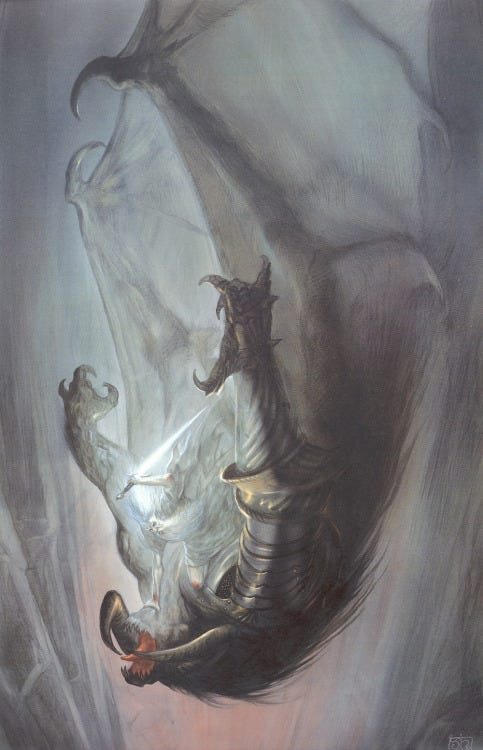Living in the Bated Breath
thoughts for Holy Saturday
Dear Reader,
“There is no end to evil,” says Holly Gibney in one of Stephen King’s novels. And perhaps, in a way, she is right. After all, she has just defeated a pair of cannibalistic serial killers. It is true that the depravity of man goes further than we can imagine. The more years I live on this earth, the more I feel this truth. Our heroes fail us, death haunts the news cycle, and some days it feels as though evil reigns unchecked. And this idea is the theme of King’s story: we all are just tiny flames beating back the darkness, so we must keep fighting.
The Lord of the Rings is full of characters bearing tiny flames of hope and goodness, fighting against a powerful dark lord and a growing evil. The fellowship embarks on a journey to destroy the ring of power, but before they can get far, their leader falls. The scene in the film version is especially heart-wrenching: Gandalf, their dear friend and mentor, stands up to the Balrog—a massive fire demon even the goblin hoard fears—but the wizard fails, plunging into the abyss. Shock and despair overtake the fellowship, the deep grief carved into their faces. How great the evil in Middle Earth must have seemed at that moment, how far-reaching and hopeless.
It is difficult for lovers of the tale like me to watch or read this scene with new eyes. After all, we already know the ending of the story: Gandalf returns just when the fellowship needs him the most. But I think of the way Tolkien might have felt losing his friends to the Great War, and I imagine he knew exactly the kind of pain felt by the characters he wrote.
And surely the disciples felt this same despair too. Powerless to stop their friend and teacher from dying a painful death, they could not escape the feeling that none of this was part of the plan. They awoke on Saturday, only to be plunged immediately back into that palpable darkness that had occurred the day before. In her advent devotional, Caroline Cobb writes about an evil so thick you can touch it, darkness no light can penetrate. It was a day of weeping like Mary Magdalene in the garden and hiding in fear like the disciples.
This sorrow is what we remember on Holy Saturday. But how can a day of such despair be holy? Because it is the bated breath between darkness and light, evil and goodness, the old covenant and the new covenant. The tension between Christ’s death and His resurrection.
Right up until the end of The Return of the King, the ring has been weaving its threads of darkness so thick, even the memory of the light seems but a dream. Frodo and Sam slog their way through the dark lord’s land, Mordor, where the sun is blotted out by shadow, creating a daylong dusk: “The night seemed endless and timeless, minute after minute falling dead and adding up to no passing hour, bringing no change. Sam began to wonder if a second darkness had begun and no day would ever reappear.” Frodo and Sam fully expect to die on that mountain surrounded by an eternal night even time cannot redeem. At this point in the story, they do not know their mentor has already returned in his more glorious form—Gandalf the White. They know nothing of the battle being waged against evil.
Evil is fragile.
However, evil is fragile. The moment the ring falls into the fires of Mount Doom, it melts away along with Sauron and all his mighty forces, swallowed up as though they had never existed at all. As deep and heavy as evil appears, God’s power and grace are eternally deeper and heavier. That weighty darkness is but a brittle glass, that immense tower is made of dust.
Though Holy Saturday and the glorious resurrection are behind us as historical events, in a way, humanity still lives in a waiting time—the tension in the “already-but-not-yet-ness” of the kingdom. Our lives on this earth are a kind of “Holy Saturday” that sometimes still feel like the black moment in the narrative arc—the point in the story when all hope is lost and helplessness threatens to overtake us. We are living in the bated breath before the kingdom.
We are living in the bated breath before the kingdom.
And perhaps there are also days that feel like our own “Holy Saturdays”, weeks or even years when we are weeping in the garden or mourning alone with no Easter morning in sight, when it seems the night will never end. In these times we can think about how Jesus’ friends felt the day before their Lord’s resurrection and remember this: Sunday is indeed coming—even if we, like the disciples, do not know exactly when. And I think, in some strange way, we can even be thankful for these days of darkness, for they give weight to the light. No matter how long and heavy and deep the night, no matter how much we feel like tiny, helpless flames against the dark, dawn always comes. And then the exhale.
Join the conversation
Where else have you seen themes of despair and hope in literature? Where else in Scripture?






Beautiful reflection!